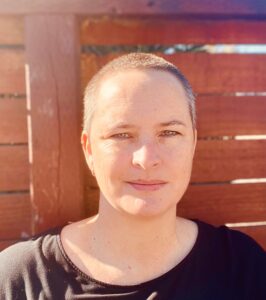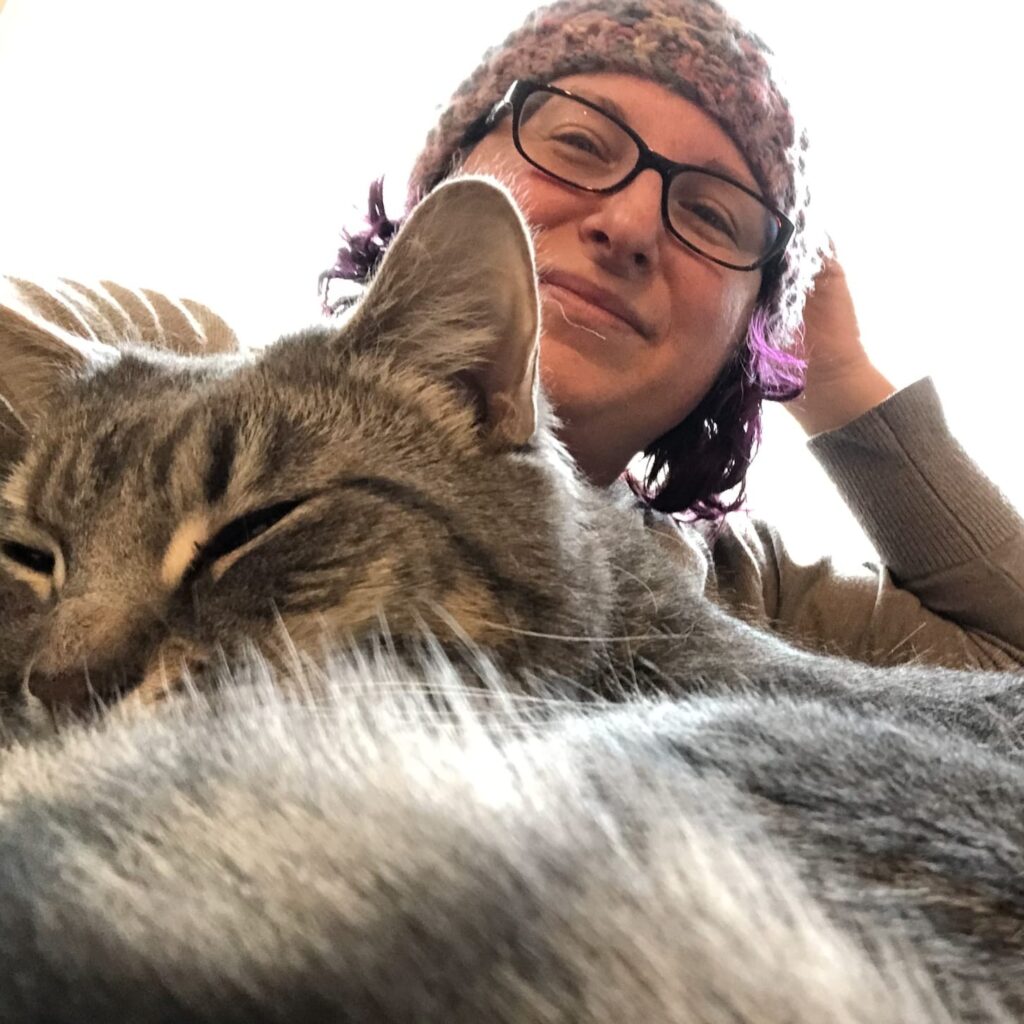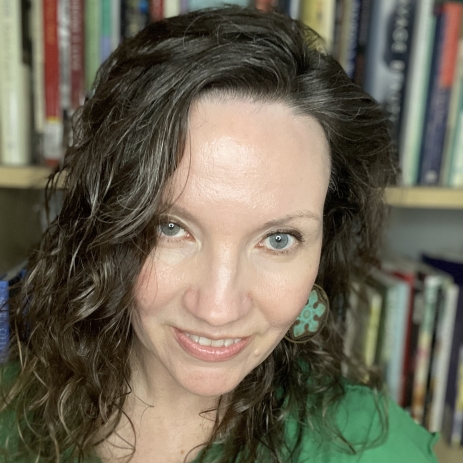Sherre Vernon in Conversation with Katie Kemple and Shana Ross: On Translating Blue
Sherre Vernon (she/her/hers) is the award-winning author of Green Ink Wings, The Name is Perilous, and Flame Nebula, Bright Nova. She has been published in journals such as Tahoma Literary Review and The Chestnut Review, nominated for Best of the Net and Pushcart prizes, and anthologized in several collections including Fat & Queer and Best Small Fictions.
Poets Shana Ross and Katie Kemple spoke with Sherre about her new poetry collection, Translating Blue, out now with Poetose (2025).
Shana Ross: I’m in love with this book. So where do we start?
Sherre Vernon: This book makes me feel so vulnerable. I’m shy every time I read from it. I feel so exposed in a way that I haven’t felt before.
Katie Kemple: One of the things that pops out—it’s even in the title—is translation. What is translating?
Sherre: What translation boils down to for me is that, as humans, we have our own experience, and every act of communication is an act of translation. It is an attempt to give me to you, or to receive you into me. And somewhere along the way, there’s disconnect. We have to find the most adjacent, the most appropriate, the most resonant sort of words to offer, because sometimes, what we need to translate is too much. It’s the emotion and the physicality. So how we slant our translation depends on questions like: Who’s the you and who’s the I and who’s the we—and why are we communicating?
Shana: Say more about who is you and who is I? Because that’s something that poets talk about all the time, the poetic I.
Sherre: That’s what I call the “MFA question” for this book. I don’t take a singular you or a singular gender in the you. I don’t assume, or ask the reader to assume, that the beloved is just one person, or a person with a single identity. Because I think that it’s a very narrow way of talking about relationship. I’ve spent decades studying how to craft poetry and I’ve written about things folks take much more seriously than love. So, if in this book I’m going to focus on love, then when I talk about love, I want to talk about it slant. I want to spend time with the long loves and revisit the loves that go in and out of my life. I want to sit with the loves that transform me. When I talk about my experience of love, it’s never singular.
Shana: How many loves do you braid together on a regular basis?
Sherre: What connects all loves is tenderness. It’s the tenderness that stays. And it’s tenderness that allows me to embrace that you love the same person I do. Because if I’m tender for that person, I can center their experience. I don’t need to own their joy. And we can do that with parental love. We can say, oh, I love my child, my partner loves my child, my mom loves my child—how lucky that child is! But as soon as it gets romantic—well.
Katie: Many of these poems have some type of transportation baked into the poem, whether you’re on a bus, train, bicycle, or you’re walking someplace. I really enjoyed that. I felt like I was moving with you through parts of your life. Did that come organically as you were writing the poems?
Sherre: I did see the motif as I was assembling the manuscript, and I appreciate you noticing it. I think when we move into spaces we are unfamiliar with, we are more open to receiving an experience translated to us—transportation as a means of transformation.
Katie: One way to view physical movement and unfamiliarity is through the poems about Russia.
Sherre: I almost didn’t put this book out right now because of the political landscape we’re in. I’m aware of what happens when we say the word Russia, and for good reason. And yet for me, who experienced Russia in the 90s—we were post 80s, we were pre this—Russia was opening up and it was falling apart. It paralleled my journey into adulthood, and I got to take that journey with some really amazing people. That part of my life allowed me to see the world more complexly.
Shana: There’s a way in which chronology gets tangled in this book. And I think that’s a geopolitical phenomenon, too, not unconnected to what you’re describing. And yet it does feel, even when we twist and turn and we are not constrained by purely linear chronology in this book, there is still a sense of motion and growth.
Sherre: I was reading about the impacts of trauma on children, and one of the things that stood out was that children who have experienced a great deal of trauma frequently have trouble with time and chronology. And I thought: Oh, hell, there it is. Sorting out what year something happened requires a calculus for me. I have time landmarks that I have to bring my memories to someone else’s understanding of time and space and reality.
Shana: It’s a beautiful form of translation, to open that window into your experience. I think that you have done such a beautiful job of threading that needle between representing your own lived experience but also making it accessible with an eye towards folks who do feel bound by these more conventional sensory understandings.
Sherre: It’s how I try to live: You’re welcome here, but this is where I am and these are my boundaries. When I was young, I just made way for others.
Katie: Other avenues of transformation and movement seem to appear in your references to tarot, specifically poems like “The Hermit”, “The Devil”, “The Lovers”.
Sherre: Several years ago, I did a poetic study of the Major Arcana by looking at relationships, people, and place. There are some tarot poems in my first collection as well. When I was doing this project with the Major Arcana, I would pull up several of the same cards across multiple decks and compile the images from those cards. I would read varying interpretations of each card, and each card reversed, list out keywords, associations, astronomical symbols, gemstones, etc. Then, I would ask: what does this tell me about my life and the people in it?
Shana: I am fascinated that you have a habit of understanding yourself in plural! Even in a metaphor space, you gravitate towards this plurality of experience, even if it ultimately leads to some kind of uniform sort of vision, translation.
Katie: I know we talked a lot about translating, but what about blue?
Sherre: This shirt is blue. The sky is blue. They look nothing alike, but we’re just going to call it all blue. That’s not true in every language. That small realization—that people interpret colors differently across languages— opened the door for me to understand the magnitude of difference between how two people might walk through the world. And, of course, in English, blue is also a marker sadness. It’s peacefulness. It’s a gendered word. It’s a political word. It’s the color of water and the ocean. Here we are again at pluralities.
Katie: What is your hope for this book now that it’s out in the world?
Sherre: I hope people read Translating Blue and pass it to someone else. I hope it invites us to tenderness, for all of us.
Shana Ross is a newcomer to Edmonton, Alberta and Treaty 6 Territory. Qui transtulit sustinet. Her work can be found in Whale Road Review, Ninth Letter, Grain, Literary Review of Canada and more. She is two years into a project of befriending the neighborhood magpies. Just in case.
Katie Kemple is a poet based in Southern California, and author of Big Man (Chestnut Review Chapbooks, 2025). Her poems have been curated by Ploughshares, Rattle and North American Review. More of her work can be found at katiekemplepoetry.com.
Table of Contents for Flaw and Favor



